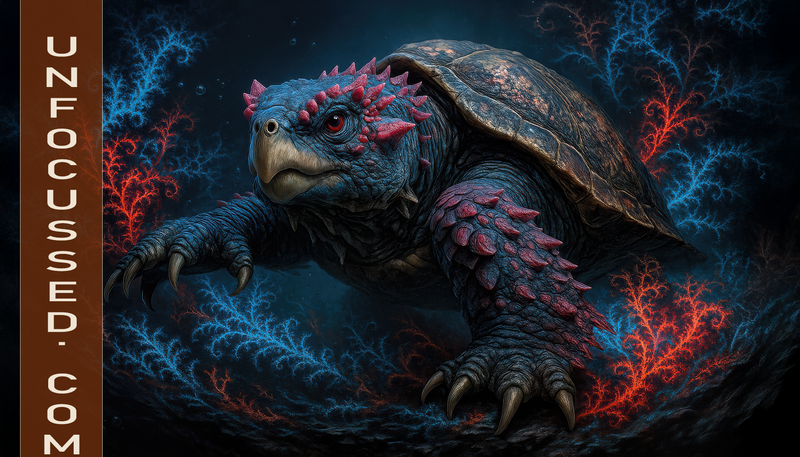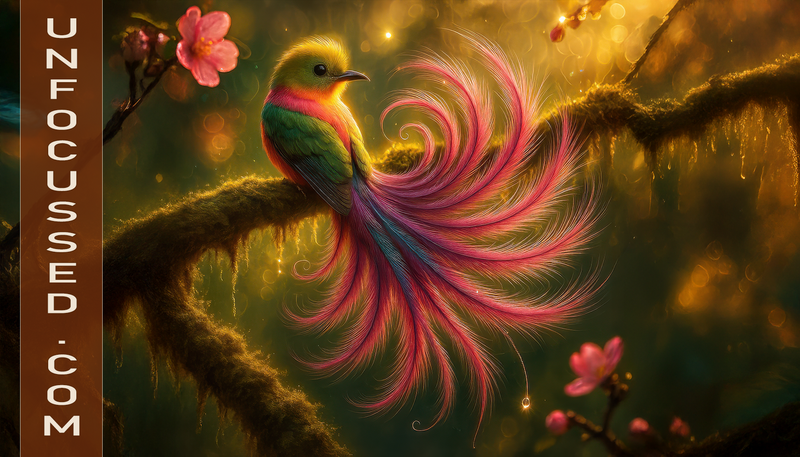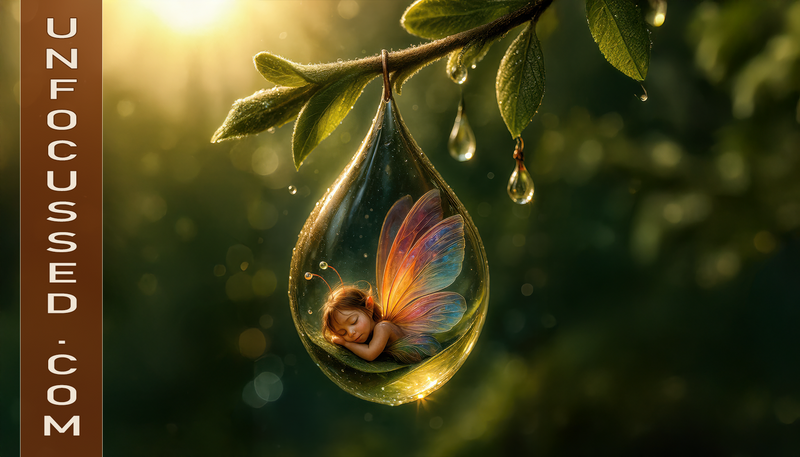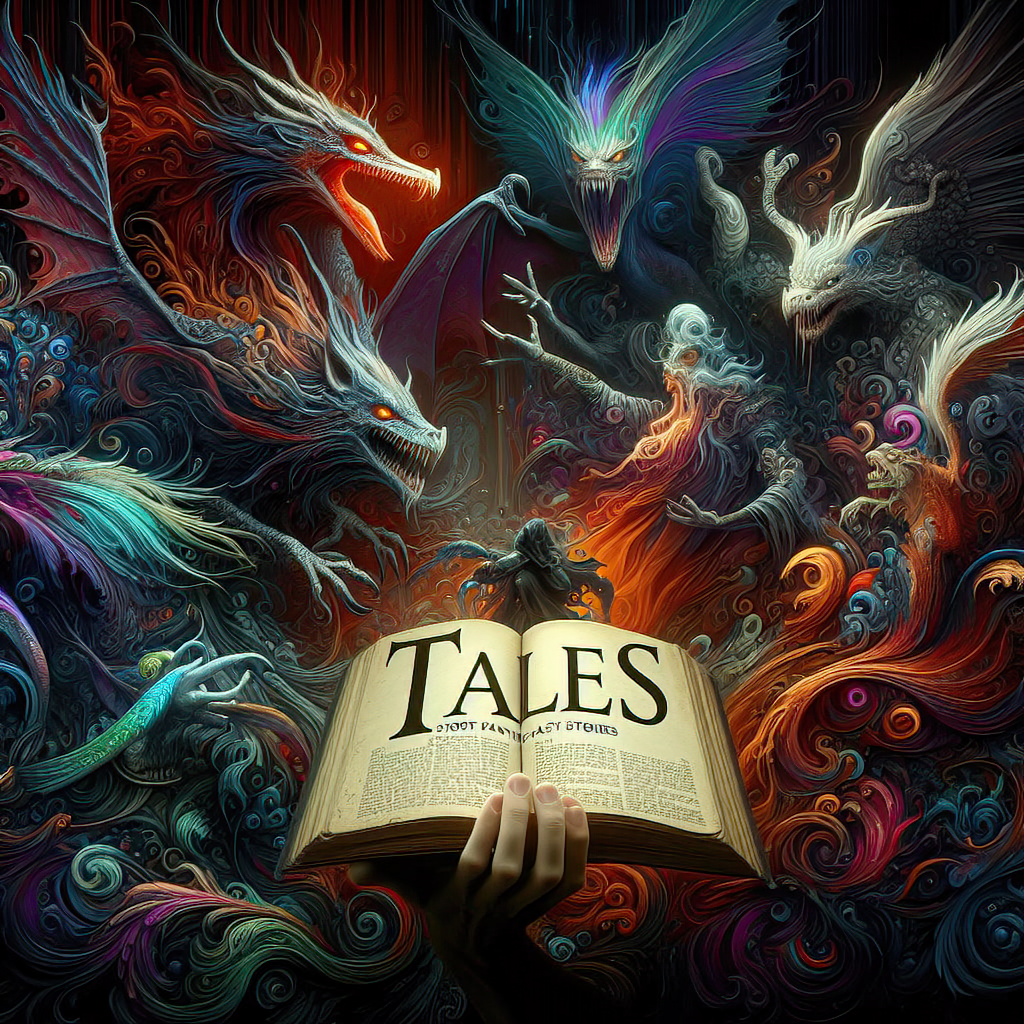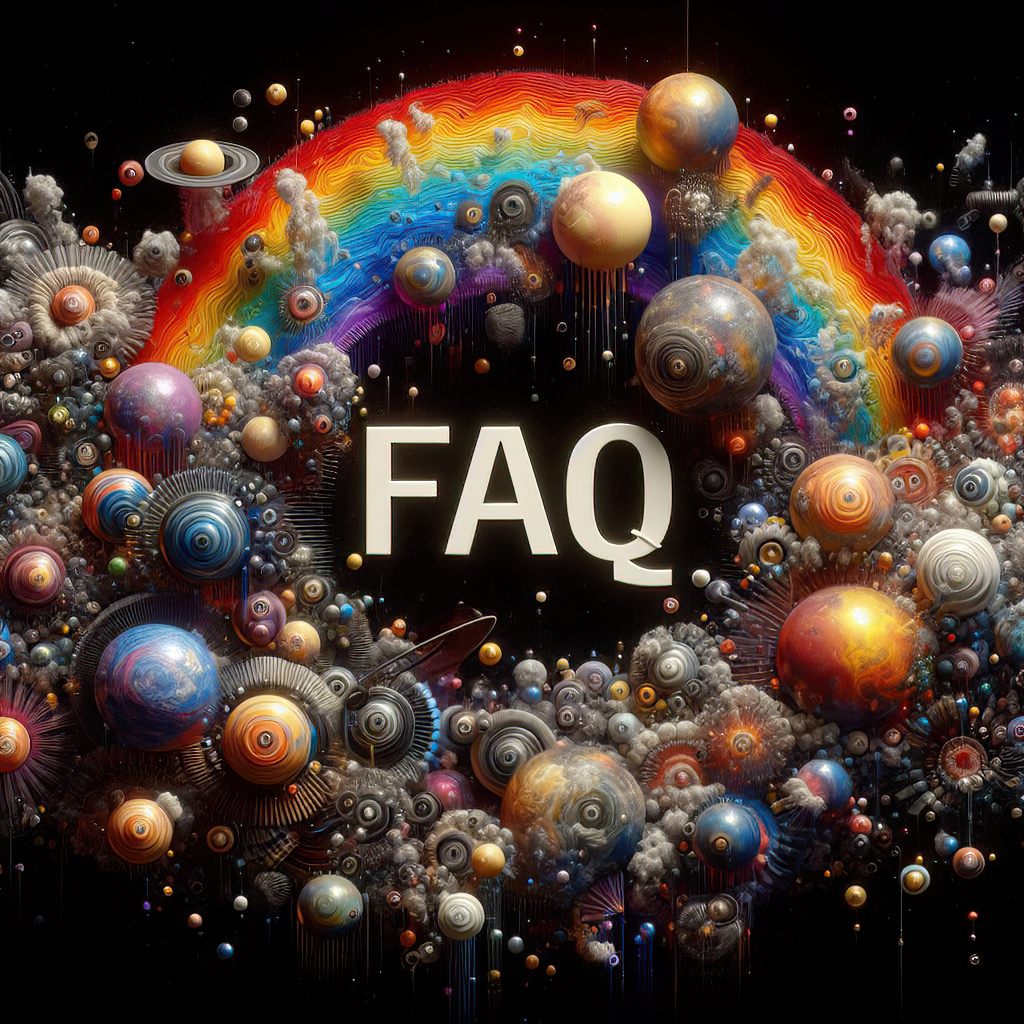
por Bill Tiepelman
Tea With a Twist of Madness
Welcome to the Unhinged Hour The teacup trembled in his hand, but not from age or tremor. Oh no, that wasn’t his style. This was deliberate—an invitation. A shivering clink of porcelain against porcelain, timed to the second, meant to drive anyone listening just a little more bonkers. He grinned, blood dribbling neatly from the corner of his mouth like raspberry jam from a cracked scone. “Darling, do come in,” he purred. “We’re just one scone short of a psychotic episode.” Her name was Maple. Not that it mattered. He had already renamed her in his head: Spoonette. She had the precise amount of judgmental eyebrow and unseasoned curiosity that made her the perfect guest. Human enough to ask why the sandwiches were whispering. Dull enough to eat them anyway. The Mad Hatter—though he preferred 'Sir Hatsalot the Unbalanced'—flourished one gangly arm toward a seat upholstered in mismatched socks. “Sit, sit! The tea won’t murder itself.” Maple hesitated. The chair burped. She sat anyway. “Now then,” he said, plopping down across from her with the elegance of a flung marionette. “Tell me what brings you to the edge of reason, across the river of sanity, and into my dribble-stained garden of demented delight?” He poured from a teapot shaped like a screaming frog, red liquid splashing into her cup with the viscosity of regret. “And before you ask—yes, it is tea. Technically. Spiritually.” Maple opened her mouth. Closed it. Decided nodding was safer. He sipped theatrically, smearing crimson across his chin. His teeth gleamed like porcelain gravestones. “Oh, she’s clever,” he whispered to the cup. “Did you see how she didn’t ask? That's respect. Or fear. Either way, delicious.” The garden around them writhed with creeping vines, disembodied hats bouncing around like caffeinated rabbits. A chandelier swung lazily from nothing above, draped in spoons and moth wings. Something giggled from behind the sugar bowl. Possibly the sugar bowl. But the Hatter kept his eyes on her. “You seem nice,” he said, leaning in. “I like that. Nice people scream better.” She reached for a biscuit. It hissed. She ate it anyway. He laughed—sharp, short, and uncomfortably sexual. “I knew I liked you. I’ve always admired a woman who snacks through trauma.” The teacup rattled again. Louder this time. Maple finally spoke. “Is it... bleeding?” “Not yet,” the Hatter chirped. “But give it a minute. I steeped it with unresolved daddy issues and beetroot.” From a corner of the table, a doily sighed. Somewhere behind her, the Cheshire Cat blinked into half-existence, rolled its eyes, and blinked right back out. And so the Unhinged Hour began—one guest, one hatter, and one pot of something suspiciously coagulated. Just the way he liked it. The Tart of Knowing Things The Hatter leaned forward until his hat nearly grazed the burning candle stuck to the top of a mummified hedgehog centerpiece. “Now that you’ve tasted trauma with a side of biscuit,” he grinned, “let’s move on to the amuse-bouche of revelation.” He produced a small tart from beneath his sleeve. It was glistening, dark, and trembling slightly, as though it regretted existing. “This,” he said, holding it out like a sacrament, “is the Tart of Knowing Things. Eat it, and you’ll understand absolutely everything... for five to seven minutes.” Maple squinted at it. “What kind of things?” “All the things. The cosmic things. The unsettling things. The stuff you think about at 3:17 AM when your ceiling fan sounds like it's trying to confess to murder.” She looked down at the tart. It twitched. She looked back up. “Will I still be me afterward?” He shrugged. “Hard to say. That depends entirely on how much of ‘you’ is made of denial.” Against every instinct her childhood therapist had installed, she took the tart and popped it into her mouth. The moment it hit her tongue, the world bloomed sideways. Colors became smells, time hiccupped, and the table started reciting slam poetry about abandonment issues. Her mind opened like a back-alley curtain, and behind it stood a naked version of herself, dramatically weeping into a croissant. And then—clarity. She knew. She knew the Hatter’s real name was Harold. She knew the spoon collection was organized by trauma category. She knew the tea was not tea. And, most importantly, she knew that the chandelier overhead was sentient and judging her for that time she kissed Greg behind the frozen peas in college. Bastard Greg. She came to with a scream that was mostly vowels. The Hatter applauded, setting off a chain reaction of polite clapping from the hats on the table. “Well done!” he shouted. “Most guests only scream in German.” Maple slammed her teacup down. “You drugged me!” He scoffed. “I enhanced you. You’re welcome.” She looked down. Her legs had grown tiny shoes and were dancing independently beneath the table. The Hatter took a long, luxurious slurp of his not-tea. “Now that you’ve been spiritually exfoliated,” he said, “you’re ready for the riddle segment.” “There's a riddle segment?” He stood, dramatically sweeping his arms. “Of course! Every good tea party includes riddles, emotionally compromised guests, and light necromancy.” He cleared his throat and began: “What has twelve eyes, three opinions, and one regret named Carl?” Maple blinked. “Is it you?” The Hatter grinned. “Nope! It’s my mother. But close enough. Partial credit. You win a whisper.” Before she could decline, he leaned across the table and whispered something so outrageous, so wildly profane, so cosmically bizarre, that one of her eyelashes burst into flames. The candle-laden hedgehog clapped its little paws in approval. “That was not consensual whispering,” she mumbled, patting out the smolder. “Neither was this table setting,” he quipped, gesturing toward a bowl of lemons that were actively fighting amongst themselves. Just then, a faint bell chimed in the distance. The Hatter froze, mid-lick of his cup’s rim. “Ah,” he murmured. “The Twelfth Teacup is arriving. She’s never late. She’s just fashionably apocalyptic.” Maple, still high on existential pastry, tried to steady her breathing. “Who’s the Twelfth Teacup?” His expression turned solemn, for exactly three seconds. Then he burst into giggles. “You’ll see. She’s a delight. If delight were a grenade inside a Victoria’s Secret bag.” And with that, he stood, bowed with the elegance of someone who learned manners from a pirate, and beckoned her toward a doorway that hadn’t been there a moment ago—arched in teacups and glowing faintly with menace. “Come,” he said. “Let’s ruin what’s left of your dignity together.” She stood. Her chair sighed in disappointment. The chandelier coughed. Maple followed him through the arch, the walls pulsing like they were breathing, and the faint sounds of croquet played with screaming hedgehogs echoing ahead. She did not know what lay beyond, only that it smelled like cinnamon, regret, and something aggressively floral. But she knew one thing for sure: if she survived this tea party, she was definitely leaving a bad Yelp review. The Rise of the Twelfth Teacup The corridor curved like a serpent on meth, pulsating with floral wallpaper that blinked in sync with Maple’s mild anxiety attack. The Hatter skipped ahead, humming a tune that sounded suspiciously like “Stayin’ Alive” played backward. With each step, the air grew thicker, syrupy—like breathing through raspberry jam laced with sass. Lights flickered overhead, not from faulty wiring, but from personal spite. “Nearly there,” the Hatter chirped. “The Twelfth Teacup loves making an entrance. She once showed up inside a flamingo.” “Alive?” Maple asked. “Debatable.” The door at the end of the hallway was made of what appeared to be interlaced cat tails. Actual tails. They twitched as they opened themselves with a dramatic yawn, revealing a vast, shadowy ballroom where gravity was more of a suggestion. Chandeliers spun like confused ballerinas. A tea fountain gurgled blood-orange Earl Grey from a gargoyle’s mouth. A harp played itself in the corner and had very strong opinions about polyamory. And there, rising from a mound of stale biscotti like a chaos phoenix, stood the Twelfth Teacup. She was radiant in the way a solar flare is radiant—beautiful, terrifying, and likely to burn off your eyebrows. Her dress was stitched from mismatched pocket watches and scandalous secrets. Her lipstick was unapologetically venomous. Her eyes? Two twin galaxies contemplating homicide. “You brought a mortal?” she hissed, her voice both sultry and echoing like an emotional Yelp review. “She ate the Tart of Knowing Things,” said the Hatter, bowing so deeply he vanished entirely for a moment. “She’s earned her chaos badge.” Maple curtsied. Badly. A teaspoon exploded nearby in protest. “Very well,” the Teacup purred. “Let the Ceremony commence.” Two skeletal flamingos clattered into the room carrying trays: one with teacups, one with weapons. The Hatter raised an eyebrow. “Dealer’s choice, love.” Maple looked back and forth. “...Is it always like this?” “Only on days that end in ‘why.’” She grabbed a teacup. The Hatter grabbed a chainsaw. The Twelfth Teacup sighed and pulled out a live crab wearing a monocle. “To the table,” she declared, floating there like an angry bar mitzvah balloon. The Grand Table was absurdly long and hovered six inches off the ground. As they took their seats, chairs sprouted legs and adjusted themselves with judgmental groans. Maple found herself between the Hatter and a sentient pile of hair named Carl. Carl winked. She politely ignored him. “The rules are simple,” the Teacup explained. “We pour. We sip. We confess our most forbidden truths. And then we wrestle, spiritually or otherwise.” Maple blinked. “Is this... strip confession tea wrestling?” “It’s tradition,” the Hatter whispered, already barefoot and halfway into a feather boa. One by one, they poured steaming liquid into their cups. Maple’s smelled like licorice and broken promises. The Hatter’s hissed when touched. Carl’s cup filled itself with what could only be described as hot existential dread. They drank. All at once. And then, like a switch was flipped in her psyche, Maple stood up and confessed. Loudly. To everything. She’d never tipped a street musician, not once. She lied about liking goat cheese. She once pretended to be a cat for two weeks in college to avoid finals. Meowed in class. Got an A. The Hatter followed: “I once spooned a banshee, purely for warmth. She howled my name for hours. We still send each other dead roses.” The Twelfth Teacup rose like a vengeful sorceress. “I created Boy Bands just to distract humanity from my dark machinations. You’re welcome for the bops.” It escalated quickly. Carl accused the harp of ghosting him on a third date. The chandelier sobbed in Latin. The tea fountain began to spray wine. Someone somewhere shouted “YOLO!” and tried to wrestle a ghost in formalwear. Suddenly the walls collapsed outward, revealing a carnival tent under a sky made of swirling wallpaper and judgment. The tent was on fire, but politely so. “This,” the Hatter said, spinning in delight, “is the end of the party! The madness crescendo! The tea-nal reckoning!” Maple’s cup exploded. She laughed. Honest, guttural, ridiculous laughter. Something inside her cracked open—not painfully, but joyfully. A part of her that had been sipping tepid normality for years finally slurped the insanity it had secretly craved. “What happens now?” she asked. The Twelfth Teacup floated by, fixing her with a grin. “Now you decide—go back to your normal life... or stay, and host the next tea war.” Maple glanced at the Hatter. He had painted his knees and was slow-dancing with a lampshade. She smiled. “Pass the tart. I’m staying.” And with that, the ballroom erupted into applause, the hats flung themselves in the air like tiny woolen fireworks, and the Hatter took her hand, twirled her into the spotlight, and declared, “Ladies and gentlemen, and others delightfully undefined—meet your new Mistress of the Absurd!” The music swelled. The tea poured. The madness danced. And Maple, once mundane and spoonless, became legend in a world that ran on nonsense, steeped in sin, and served with a cinnamon rim. — Fin. (Or... To Be Reboiled.) Love the madness? Steep yourself in it—literally. If this unhinged journey into velvet chaos and tea-fueled delirium left you smiling like a dangerously overdressed maniac, why not take a little slice of that madness home? Wrap yourself in cozy lunacy with our fleece blanket, perfect for late-night tart-fueled revelations. Or bring that slightly-judgmental-whimsy into your daily routine with a shower curtain that definitely sees more than it lets on. Need a little wall madness? The acrylic print is sharper than the Hatter’s tongue, and the tapestry turns any boring wall into a portal to stylish derangement. Because tea parties come and go, but absurdity is forever.


















